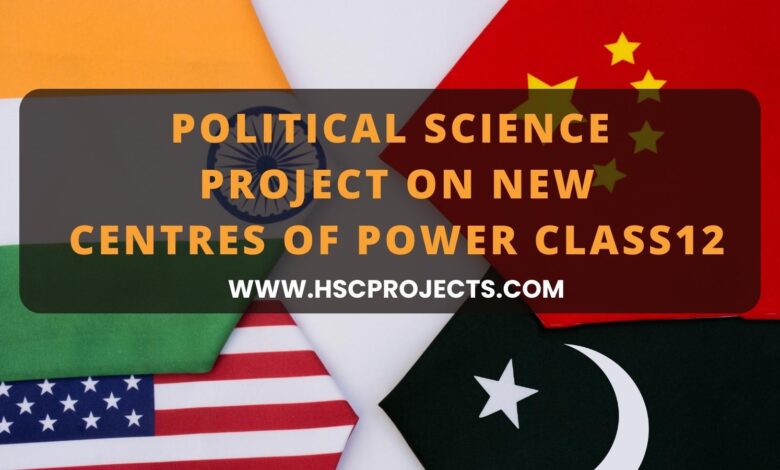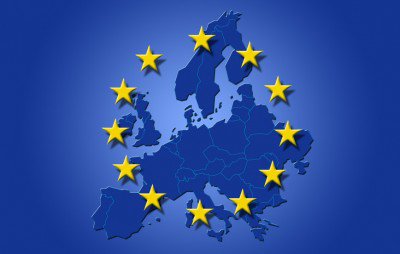
Political Science Project On New Centres Of Power Class12th
Explain The Idea Of Centres Of Power In International Relations And Why It’s Crucial To Research How New Centres Of Power Form.
The concept of centres of power describes how influence and power are distributed among many players in the global system. It has long been believed that the United States and Europe are the two major centres of power, but this belief has recently been called into question by the growth of other centres. Because it has enormous effects on international relations, global governance, and the distribution of income and resources, it is crucial to investigate the formation of new centres of power.
Centres of power in international relations are those governments or non-state actors with the capacity to influence global policy, sway the actions of other states, and exert influence beyond their national borders. These power centres can be in the political, diplomatic, military, or cultural spheres, among others.
The emergence of new centres of power is crucial because it can result in a change in the distribution of global influence and the balance of power. The establishment of new alliances, the reorganisation of institutions for global governance, and adjustments to the political and economic systems could all result from this, which could have a substantial impact on the international system.
Additionally, the distribution of income and resources may be significantly impacted by the formation of new centres of power. With the rise of new centres of power, the global economy may alter, affecting the economic prospects of other governments and regions. These centres of power may also have more access to resources and markets.
In light of these huge ramifications, it is crucial to analyse the creation of new centres of power in order to comprehend how the international system is changing and to foresee any potential difficulties and possibilities that may appear in the future.
The Traditional Centres Of Power In International Relations, Including The Us, Europe, China, And Russia, Should Be Discussed. Describe Their Historical Influence On World Politics And How It Has Influenced The Structure Of The Current International Order.
Traditional Power Centres:
The United States and Europe have traditionally held a disproportionate amount of power in international affairs, but the growth of new centres of power in recent years has put that status in jeopardy.
Due to its robust economy, significant military prowess, and cultural sway, the United States has been a preeminent centre of power since the end of World War II. Its advocacy of democracy, human rights, and free markets, as well as its readiness to employ military force to uphold its worldwide hegemony, have served to define its leadership in the international system. The US has had a significant role in a number of international concerns, including terrorism, climate change, nuclear proliferation, and peacekeeping missions.
Europe, and more specifically the European Union (EU), has also played a crucial role as a hub of power in the global order. The EU has a tremendous impact on world affairs thanks to its economic might and integration, particularly in the fields of diplomacy, trade, and development assistance. The EU has played a significant role in advancing democracy, human rights, and global governance. It has also taken the lead in debates over climate change and peacekeeping missions.
In recent years, substantial power centres have also arisen in China and Russia. Due to its rapid economic development and growing military might, China is now a significant actor in international affairs and a longstanding rival of the US and Europe. Global economic change may result from China’s Belt and Road Initiative (BRI), which aspires to build a huge network of infrastructure and commerce routes across Asia, Africa, and Europe.
Russia’s assertive foreign policy, military modernisation, and energy exports have all contributed to the country’s rebirth as a significant player in international relations. Russia has consolidated its influence in international affairs by using its veto power in the UN Security Council, particularly in situations like Syria and Ukraine.
History has shaped the dominance of these traditional centres of power through events like colonialism, world wars, and economic growth. The current international order, which is characterised by the predominance of Western liberal democratic values, global economic integration, and military alliances, is a result of their influence.

Identify And Examine The New Centres Of Power That Have Emerged Recently, Including Nations Like Brazil, India, And South Africa. Talk About Their Expanding Economic, Political, And Military Clout As Well As Any Prospective Effects On The Current International System.
New power centres have formed in recent years, upending the conventional countries’ hegemony in international affairs. Brazil, India, South Africa, collectively known as the BRICS countries, are among these rising powerhouses.
Brazil is a key actor in international affairs and has the largest economy in Latin America. Brazil has been able to participate more actively in global governance thanks to its economic growth and political stability, particularly through the G20 and BRICS organisations. Brazil has actively pushed for regional integration in Latin America as well as taken the lead in efforts to maintain peace in Haiti.
India is the main economy with the fastest rate of growth and has the second-largest population in the world. India’s expanding economic influence has given it more influence over world politics, especially in trade and investment. In addition, India has been a key player in climate change negotiations and has contributed significantly to African peacekeeping efforts.
Due to its advantageous location in southern Africa, South Africa has grown to be a prominent regional force. South Africa has a robust military, a diversified economy, and abundant natural resources. Through the African Union, it has been instrumental in advancing regional integration in Africa. On the continent, South Africa has actively worked to advance democracy and human rights.
The rise of these new centres of power has profound effects on the existing international system. A change in the balance of power and a redistribution of global influence may result from these nations’ expanding economic, political, and military prominence. The old centres of power, especially those in the United States and Europe, may be threatened by this. It might also result in the establishment of new coalitions and the restructuring of the organisations that provide for global governance.
New power structures could have a significant impact on regional, national, and international social and economic challenges. For instance, the BRICS nations have argued against the dominance of Western-led organisations like the World Bank and International Monetary Fund by supporting a more multipolar and inclusive global economic system.
In general, the rise of new centres of power emphasises the shifting dynamics of the international system and stresses the need for a more nuanced and inclusive approach to global governance.

Discuss The Impact Of Non-state Entities On The Development Of International Relations, Including Ngos, Multinational Businesses, And Terrorist Groups. Examine Their Expanding Impact On Established State-centric Power Dynamics.
Independent actors:
Non-state entities, such as multinational corporations, NGOs, and terrorist organisations, have also become important players in international relations, impacting power dynamics and world concerns in addition to traditional nations.
Multinational companies (MNCs) frequently rival the economic might of governments. MNCs have the power to affect domestic policy, international agreements, global trade and investment patterns, and more. In especially in developing nations where they may offer large investment and employment prospects, their economic strength can give them significant leverage over states.
Non-governmental organisations (NGOs) have become significant players in international relations, especially in the fields of environmental preservation, humanitarian aid, and human rights. NGOs can influence policy discussions and offer crucial services like disaster relief and development support.
However, terrorist groups have the potential to significantly affect global government and security. In addition to destabilising states and regions, they can also impede international trade and tourism. Terrorist groups pose a serious threat to world stability because they can oppose state authority and spread rival ideas.
The conventional state-centric power dynamics of international relations are under threat from the growing impact of non-state actors. States may no longer have exclusive control over influence and power, and non-state actors can frequently act outside the purview of conventional state-based institutions. This could pose problems for international governance, especially in fields where non-state players have a big say, like climate change or human rights.
The influence of non-state players, however, can also present chances for increased collaboration and partnership between states and other actors. NGOs, for instance, can contribute crucial knowledge and resources to support state-led initiatives to address global problems like poverty or environmental protection. Similar to how MNCs can collaborate with governments to support sustainable development objectives and encourage ethical business practises.
In general, the growing importance of non-state actors emphasises the need for a more open and cooperative approach to global governance, one that takes into account the variety of entities and viewpoints that affect international relations.
Discuss The Effects Of The Formation Of New Centres Of Power On The Current International System In “Power Shifts And Challenges.” Analyse The Possible Changes In Power And Difficulties That Might Occur As Established Centres Of Authority Strive To Hold Onto Their Supremacy While New Players Try To Expand Their Influence.
Power Transitions and Obstacles:
The rise of new power centres in international relations has profound effects on the current world order. New actors seek to expand their influence as established centres of power work to preserve their control, which could result in power changes and challenges.
The rivalry for resources, especially energy and raw materials, is one possible difficulty. Emerging nations like China and India may compete with traditional powers like the US and Europe as they look to meet their expanding energy needs, which could result in tensions and conflict. Similar to this, rivalry between states over access to natural resources like minerals and water sources could lead to tensions.
Restructuring of institutions involved in global governance is another potential issue. Emerging powers may challenge the established power structures as they seek greater participation in international organisations like the United Nations and the World Trade Organisation. This could result in reforms to existing institutions or possibly the creation of new ones. This may open up possibilities for more state collaboration and cooperation, but it may also exacerbate existing conflicts and power struggles.
Power changes enhance the likelihood of conflict and instability. States may adopt more assertive foreign policies, which could result in escalating tensions or possibly war. Terrorist groups, for example, may take advantage of power vacuums or altering power balances, posing new security risks to governments and the global community.
Overall, the rise of new centres of power emphasises the need for a more complex and inclusive approach to global governance, one that takes into account the variety of actors and viewpoints that influence international relations. States and other actors must communicate with one another and work together to address issues as they occur in order to advance stability, peace, and prosperity in the global order..
Conclusion:
In sum, this project looked at the idea of centres of power in international relations and investigated how new centres of power have emerged recently. We have talked about established power centres like the US, Europe, China, and Russia as well as newer ones like Brazil, India, and South Africa. We’ve also talked about how non-state actors like NGOs, multinational businesses, and terrorist groups influence world politics.
The consequences of the rise of new centres of power are crucial for the current international system. States and other actors must communicate with one another and work together to address issues as they occur in order to advance stability, peace, and prosperity in the global order. As old powers want to maintain their dominance and new actors strive to expand their influence, challenges such as the rivalry for resources and the reconfiguration of global governance institutions may materialise.
The trajectory of the world’s power dynamics is still unclear in the future. To better understand the dynamics of power and influence in the international system, ongoing research and analysis are needed due to the dynamic character of international relations. Recognising the variety of individuals and viewpoints that influence international relations is crucial, as is working to improve global governance through more inclusion and cooperation.
To sum up, the rise of new centres of power calls into question the conventional state-centric dynamics of power in international relations and emphasises the need for a more complex and inclusive approach to global governance. Understanding the evolving nature of international relations and influencing the future of global power dynamics will require further study and analysis on this subject.
Certificate of Completion
[Your Name][Your Address]This is to certify that I, [Your Name], a student of Class 12 at [Name of School/College], have successfully completed my project on “New Centres of Power in International Relations. ” The project was undertaken to explore the concept of centres of power and their significance in the realm of international relations.
Throughout the project, I delved into the idea of centres of power and how traditional power centres like the United States, Europe, China, and Russia have historically influenced world politics. I also examined the emergence of new power centres, including Brazil, India, and South Africa, and their expanding economic, political, and military clout in the current international system.
Furthermore, the project addressed the impact of non-state entities such as NGOs, multinational businesses, and terrorist groups on the development of international relations. Their increasing influence and challenges to established state-centric power dynamics were thoroughly analyzed.
Conclusively, the research explored the effects of the formation of new centres of power on the current international system and discussed possible changes in power and challenges that may arise as established centres of authority strive to maintain their supremacy while new players seek to expand their influence.
I am grateful for the guidance and support provided by my teachers and mentors during the course of this project. Their encouragement and valuable insights have contributed significantly to the successful completion of this undertaking.
By undertaking this project, I have gained a deeper understanding of the complexities of international relations and the evolving nature of global power dynamics. This research has highlighted the importance of inclusive and cooperative approaches to global governance, and I believe it offers valuable insights for policymakers and analysts in navigating the ever-changing world of international relations.
[Your Signature](Write your name in block letters below your signature)In order to download the PDF, You must follow on Youtube. Once done, Click on Submit
Follow On YoutubeSubscribed? Click on Confirm
Download Political Science Project On New Centres Of Power Class12th PDF






